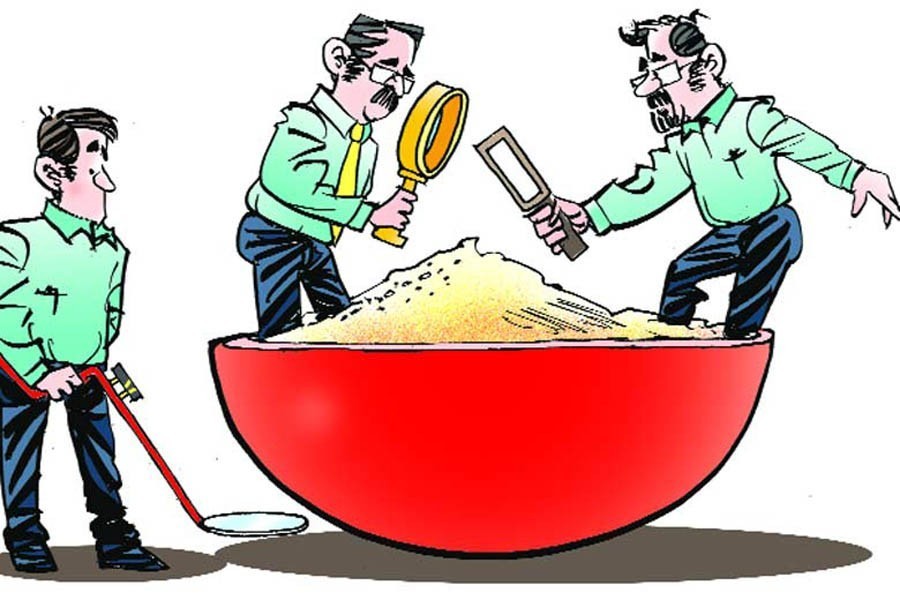The observance of a National Health Service Week (NHSW)-first of its kind -and a National Nutrition Week (NNW) simultaneously is certainly a mental leap for the nation. On the occasion, health service providers -particularly those in the public sector -will be compelled to pull their socks up. The message that ought to get across is simply, 'every citizen has a right to health service'. Now that the country has nearly won over one of the punishing facts of life, hunger, the country can afford paying attention to quality foods and healthcare. The two are interrelated so far as the national health index is concerned.
Intake of poor quality and adulterated foods is responsible either for malnourishment or diseases or both. Sure enough, rich foods alone cannot ensure sound health. Dishes have to be balanced with various components of micronutrients present in required proportion for an individual. Those may vary from person to person. Even this is not enough to give one a sound mind in a sound body. Lifestyle matters. There is need for physical exercise. The irony is that those who have to do rigorous physical labour do not get enough nutritious food to eat and those who can afford any food you name hardly opt for a regime of physical exercise or exertion.
Inaugurating the NHSW and the NNW, Prime Minister Sheikh Hasina has pointed out that the nation must take a long view in order to go for prevention rather than cure. Indeed, staying healthy is more important than falling ill and seeking cure in any specialised healthcare facility. But it is easier said than done. On the paper, though, it is not a daunting task for people with moderate means to chart a regular food habit and set a healthy lifestyle. However, few people maintain an orderly regime in favour of a fit body and mind. Concerned here are people who have the wherewithal to go about such routines.
Then there are extremely busy people whose nature of job hardly allows them to follow certain set health rules or food items. Even amidst busy schedules, they can take a break in order to nourish their body for a while and bring about changes for the better in their food habits. As for the wretched of society who still cannot manage a square meal, physical nourishment remains a distant dream. It is here that society's collective responsibility counts. Against the fast and furious wealth accumulation by a segment of society, economic disparity is also widening. Unless, the hapless class at the bottom are pulled out of the mire, a lost generation will be there to pull down the social progress -no matter how impressive it apparently may look. Under any social safety net, they may keep their body and soul together but they will lag far behind the national caravan.
Alongside food security, food safety also comes to the fore right now. That antibiotic, harmful chemicals and poisonous substances are entering the food chain, courtesy of inadequate knowledge of application of fertiliser and pesticide and also deliberate treatment of perishable items like vegetables, fish, meat and fruits with chemicals, is no secret now. Even the liquid and powder milk available in packets are now suspect. Samples collected months ago for laboratory tests should have been enough to inform the public if the different brands of packet milk are good enough for human consumption. Unfortunately, there has been an inordinate delay in doing this.
Clearly, staying healthy or disease-free does not necessarily depend on one's own effort and wishes. The market from where foods are procured should ensure that anything sold for consumption must be hundred per cent safe. Surely, this calls for raising the living standard of people. Bangladesh is yet to reach that stage of living. In the United States of America, the Food and Drug Administration ensures, with its probing eyes, that nothing harmful passes the screen to cause health problems to the country's citizens. In this country such instruments are yet to be developed to a stage where it can play a similar role. Dedication of weeks to health service and nutrition is a small step but a giant mental leap for the nation.
Let the loose ends be put together gradually but at least the process should be started now in right earnest. One only hopes that a campaign will be launched both at the field level among growers of crops and outlet level. Wholesale and retail traders in the country need powerful orientation to be convinced of the merit of feeding the nation unadulterated and uncontaminated foods. At the same time, it has to be ensured that perishable items reach their destination within a short time so that chemical treatment is not required for increasing their shelf life. In the same breath, the authorities must remain vigilant that immature fruits such as mangoes are not ripened with chemicals. Then animal, chicken and fish feeds have to be free of antibiotic and agents of hormone growth.
The fact that more people are developing cancers may indeed have link with adulterated and contaminated foods. In that case, the sources of poisonous contamination have to be plugged once for all in order to ensure better national health.


